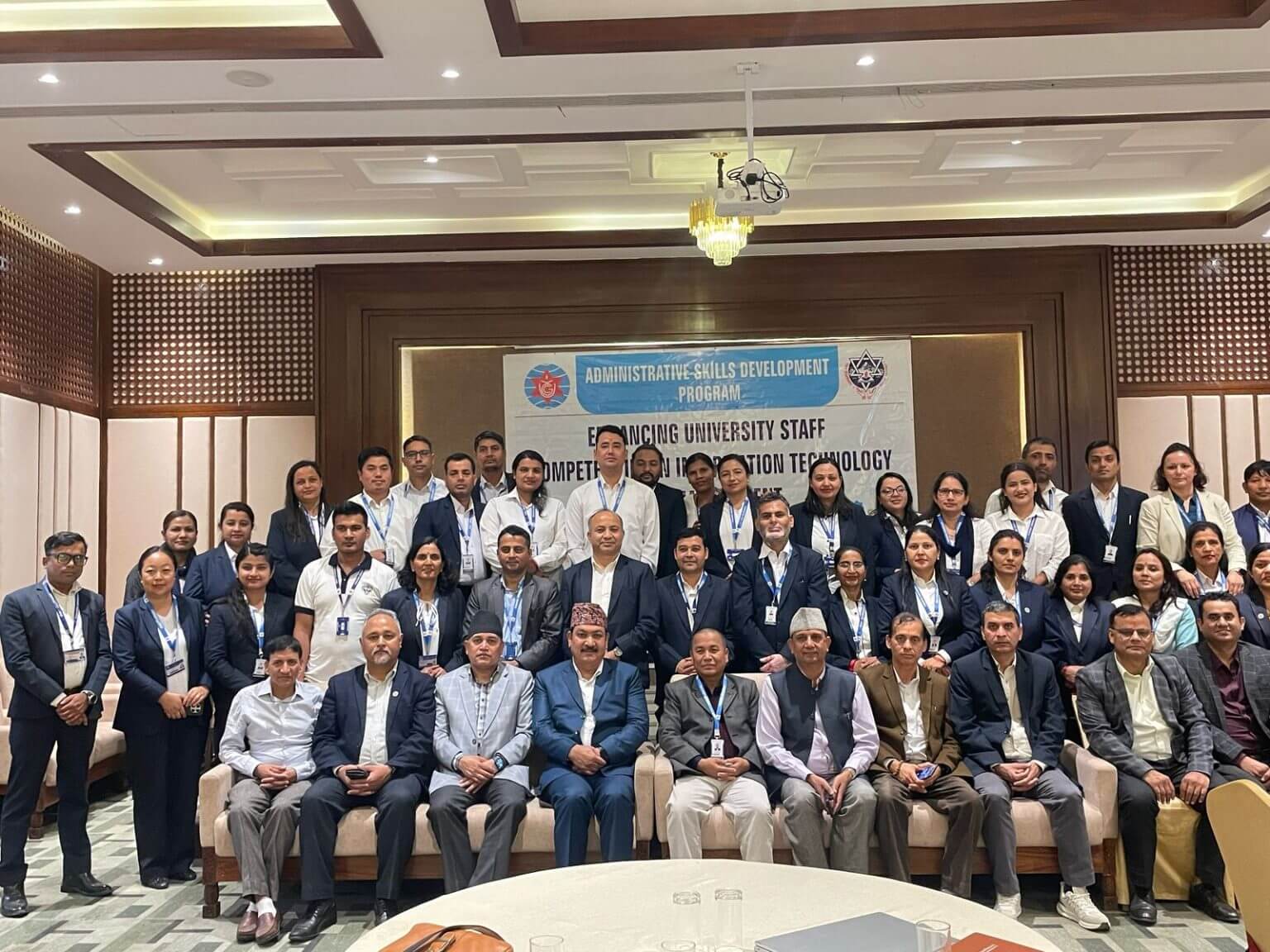
Pokhara University has completed a one-week administrative capacity development training to strengthen the skills of its staff in information technology and management. Conducted in cooperation with the University Grants Commission (UGC) Nepal, the 45-hour (3-credit) training was held at Hotel Landmark, Lakeside, Pokhara, from Chaitra 27, 2081 to Baisakh 2, 2082.
The opening session was held under the chief guestship of Vice Chancellor Prof. Dr. Bed Raj K.C. The program was attended by Registrar Prof. Dr. Deepak Bahadur Bhandari, deans from various faculties, and heads of different departments. A total of 33 employees from different administrative and accounting branches of the university, from officer to assistant level, took part in the training.
The sessions covered several practical and technology-friendly administrative topics. Training was provided on major duties and responsibilities of university staff, budgeting and accounting systems, public procurement processes, document preparation methods, use of AI tools, Microsoft Excel and PowerPoint, office conduct, staff motivation, interpersonal relationship management, mental health, office administration, minute writing, official correspondence, Windows utilities, table creation, and dataset preparation.
Sessions were conducted by Dr. Dayaraj Dhakal, Assistant Administrator Tara Devi Sapkota, Assistant Administrator Gobardhan Bhattarai, Assistant Administrator Tejnarayan Parajuli, Assistant Administrator Tolmaya Thapa, Engineer Santosh Paudel, Engineer Yagyanath Rimal, Engineer Kiran K.C., Dr. Dileep Raj Paudel, Ram Prasad Thapaliya, Nisha Rajkarnikar, Sushant Paudel, and Uttam Acharya.
The closing session of the administrative training was conducted with Associate Prof. Dr. Amar Nagila, Dean of the Faculty of Health Sciences and Acting Vice Chancellor, as the chief guest. He said the training focused on relevant and useful subjects, and that the participants received a good opportunity to learn, understand, and share experiences over the seven days.
He mentioned that employees working in knowledge-based institutions like universities need to develop skills in IT and management, and with the current trend of AI, manual work is becoming less effective. He encouraged participants to apply what they learned in their jobs.
Similarly, Associate Prof. Dr. Dayaraj Dhakal, Dean of the Faculty of Management and Acting Registrar, evaluated the overall training management and participants’ enthusiasm positively. He expressed belief that participants would apply their gained knowledge and skills in the workplace to become more efficient and productive.
Associate Prof. Dr. Purna Bahadur Khadka, Coordinator of the Administrative Capacity Development Training Committee, said that the training was the result of strong teamwork. He stated, “A proposal on the training modality and trainer selection was submitted to the University Grants Commission (UGC). After receiving approval, the program moved forward. Trainers were selected from experienced university staff and a few external experts who clearly understood the needs, challenges, and possibilities of the institution. Therefore, the training contents were prepared with their active participation and the sessions were conducted effectively.”
Dr. Badri Aryal, a member of the training management committee and Associate Professor, stated that this was a model and first-of-its-kind training in the context of Nepal. “This type of training is the first in Nepal. We managed to start the program after submitting a proposal to UGC and receiving approval,” he said.
During the event, trainer, program host, and Assistant Administrator Mrs. Tara Devi Sapkota mentioned the importance of creating a positive environment in the university that promotes respect, support, and appreciation for staff. She further stated that such training programs should be continued in the future to increase staff participation and skill development.
On the occasion, trainee Gayatri Paneru shared her feedback on the training and said, “This training helped us develop both personal capacity and professional skills. We realized the importance of applying what we learned at the workplace instead of keeping it limited to ourselves. These kinds of opportunities should continue.”
Another trainee, Toran Bahadur B.K., said that including IT-related subjects in the training was a positive step. “Topics connected to IT were included, which were timely and useful. The work experiences shared by seniors were inspiring. The training would have been more effective if the sessions on rules, regulations, and management were presented more clearly and practically,” he shared.
The training management committee was coordinated by Associate Prof. Dr. Purna Bahadur Khadka. The committee included Associate Prof. Dr. Bishwanath Lamichhane, Associate Prof. Dr. Hari Prasad Kafle, Associate Prof. Dr. Dipanjal Shrestha, Dr. Badri Aryal, and Dr. Pradeep Sapkota as members. Humadevi Paudel participated as a staff assistant.
Pokhara Pokhara University

